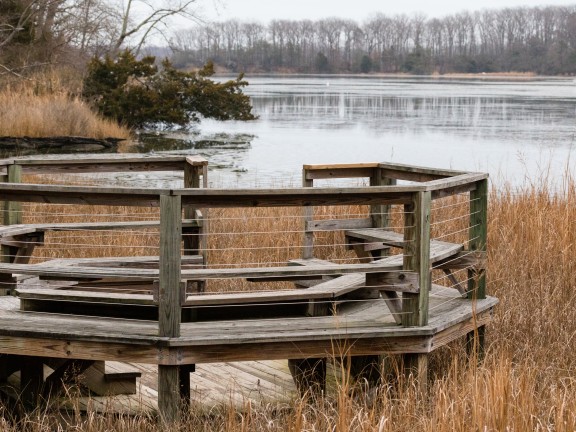Comments and Letters

Organizations within the Chesapeake Accountability Project periodically comment on pending water pollution permits, rules, and other matters. This page includes summaries of those comments and letters and links to full-text documents.
Comments to the Maryland Department of the Environment on Remand of General Permit for Discharges from Stormwater Associated with Industrial Activities (20SW)
November 23, 2022
In public comments, several organizations, including the Chesapeake Bay Foundation, Chesapeake Legal Alliance, and the Environmental Integrity Project, strongly urged MDE to make significant changes to the General Permit in order to advance the State of Maryland’s priorities with respect to environmental justice, climate change, and protection of water quality for the Chesapeake and Atlantic coastal bays. They included several recommendations for accomplishing that work.
Comments to the Maryland Department of the Environment on Hawkins Point Plant Landfill Permit Renewal
October 7, 2022
In public comments, the Chesapeake Accountability Project encouraged MDE to improve the draft water pollution permit for the Hawkins Point Plant industrial waste landfill in Baltimore. Among other things, the comments urge provisions, requirements, and limits related to mercury, PFAS chemicals, and iron, as well as require what's known as Whole Effluent Toxicity (WET) testing.
Letter to the Maryland Department of the Environment on Lapsed Water Pollution Permits
August 9, 2021
In this letter, the Chesapeake Accountability Project and its partners raised a set of specific concerns about lapsed water pollution permits in Maryland and the potential for largely uncontrolled pollution flowing into the Chesapeake Bay watershed and the region's communities.
Letter to the Maryland Department of the Environment on Enforcement of the Maryland Industrial Stormwater Permit
July 19, 2021
In this letter, the Chesapeake Accountability Project raised a set of specific concerns about how the Maryland Department of the Environment enforces the Maryland General Permit for Discharges from Stormwater Associated with Industrial Activities (industrial stormwater permit). The project partners also provided MDE with a set of recommendations to better protect people and the environment from water pollution that runs off of industrial sites during storms.
Comments on Renewal of the General Permit for Discharges from Stormwater Associated with Industrial Activities
April 16, 2021
The Chesapeake Accountability Project (CAP) and other stakeholders submitted comments on the Maryland Department of the Environment's (MDE) tentative determination to renew the General Permit for Discharges from Stormwater Associated with Industrial Activities (known as the industrial stormwater permit). This permit is an important opportunity to create clear, specific, measurable, and enforceable requirements to reduce polluted industrial stormwater runoff, which can be particularly toxic and hazardous to human health and aquatic life, and which poses a unique threat to our common goal to promote environmental justice in Maryland.
However, the current permit up for renewal poses substantial risks to the health of local communities and waterways and to Maryland’s efforts to restore the Chesapeake Bay. CAP and other stakeholders offer recommendations for improvements and increased permit effectiveness.
CAP and other stakeholders also urge MDE to slow down the permit renewal process. Though the permit's renewal cycle is long overdue, the current, expedited process shortchanges public participation, community input, and would result in a permit that could do significant harm to communities in the Chesapeake Bay watershed. This would violate several laws and go against the federal EPA's renewed commitment to restoring the Chesapeake Bay, promoting climate resilience, and attacking environmental injustices.
Read the comments and all appendices.
Comments on Renewal of the Municipal Separate Storm Sewer System Discharge Permits for Four Maryland Jurisdictions
January 21, 2021
The Chesapeake Accountability Project and other stakeholders submitted comments on the Maryland Department of the Environment's tentative determination to renew the National Pollutant Discharge Elimination System Separate Storm Sewer Systems Discharge Permits for four jurisdictions: Anne Arundel County, Baltimore City, Baltimore County, and Montgomery County. Click each link below to read the comments in full.
Anne Arundel County
Baltimore City
Baltimore County
Montgomery County
Comments on Renewal of Maryland General Permit For Stormwater Associated with Construction Activity
December 23, 2020
The Chesapeake Accountability Project and other stakeholders submitted these comments on the Maryland Department of Environment's ("MDE" or "the Department") tentative determination to renew the General Discharge Permit for Stormwater Associated with Construction Activity. The Chesapeake Bay restoration effort has hit a critical point. At the same time that the seven Bay jurisdictions have submitted their final plans for cleaning their rivers and streams and restoring the Bay, the restoration community faces many obstacles, including funding shortfalls, inadequate enforcement of laws and regulations, and waning government commitments to the Bay's restoration. In this letter, we summarize some of the specific concerns with the draft permit and requests regarding improvements we urge MDE to adopt within the draft permit. An appendix is also available.